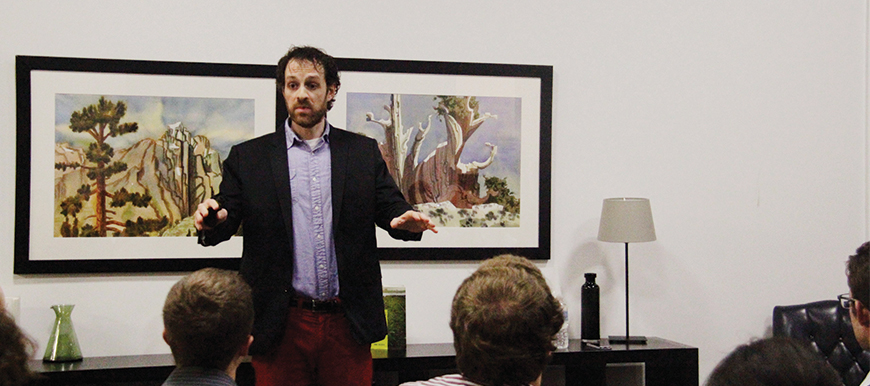Economist warns danger of unsustainable aid
Christopher Coyne, an economist and professor at George Mason University, spoke in downtown Logan on Monday about the effects of humanitarian efforts and aid from an economical standpoint.
“What I want to suggest is that basic economic theory — an economic way of thinking — can get us quite far in understanding what the limitations of state-led humanitarian action can do,” Coyne said.
Many people, even without understanding all of the factors in a country such as its state of being and economy, still feel that there has to be something done to help after something has gone wrong, Coyne said.
“Understanding the limitations on what we can achieve in the world and what we can do to improve it is just as, if not more important than focusing on what we can’t do,” he said. “If our goal is to help people to avoid imposing additional harms on people who are already suffering, we need to understand what our constraints are because we run the risk of not just failing, but of harming those who are already suffering.”
He said there are simple, realistic ways for people to make a difference, but it starts with becoming more informed and willing to accept that huge solutions aren’t ever going to pop up and become plausible.
Sonia Manuel-Dupont, assistant professor at USU, also believes there is a real difference between effective and ineffective humanitarian aid.
“I think that a lot of groups want to do good in a third-world country but they don’t think about sustainability and cultural appropriateness,” Manuel-Dupont said. “A lot of people will go in and will be very enthusiastic and can have some great ideas and have done some research, but perhaps that idea is not the right idea for that particular community.”
Manuel-Dupont is a member of SeeeMe, which stands for Sustainable Engineering, Economics and Education, a non-profit group dedicated to assessing the real humanitarian needs of communities in third-world countries.
“We go in and identify a need and do what the community is interested in,” Manuel-Dupont said. “Ultimately it’s got to be for and decided by them. A lot of times it’s because a community doesn’t have the research or the knowledge to sustain what they have been given.”
The desire to help and serve others is good, but if groups are going in and dropping off any form of aid and then leaving, once it’s gone, it’s gone, Manuel-Dupont said.
“And the people will come to view you differently,” she said. “Suddenly, if it’s not a community involvement anymore, it’s just more of a drop in, drop stuff off and leave.”
Lakin Hutchings, a 2013 USU graduate in business marketing, had the opportunity to spend a summer in Peru and be involved with Help International.
“Help’s focus is to create sustainable projects, so each year when volunteers arrive on site, they survey the needs of the community, and then it’s up to them to design projects to meet those needs,” Hutchings said.
Hutchings ran business workshops with a a group of artisan women who were struggling to make a profit for the work they did. By the end of the summer, the women were running businesses and exporting their goods all over the globe.
“They made more than five times what their husbands did in the rice fields each month and that was super fulfilling,” Hutchings said.
Manuel-Dupont’s husband Ryan Dupont, also a professor at USU, is the faculty advisor for the Mexico team of USU’s chapter of Engineers Without Borders. EWB works only in small communities, and groups of six to eight students, with at least one engineer and advisor, will go on annual trips to aid in creating sustainable humanitarian projects.
“We build long-term relationships with communities; that’s our model with EWB,” he said. “Once a chapter identifies a project,it’s at least a five-year commitment to work with that community on projects to help in a variety of different ways.”
EWB will go in, assess and prioritize needs in a community and then work with the community, whose leaders are also committed to any projects. The most recent project has been in central Mexico building water tanks for homes in the community to use for accessing their water supply, Dupont said.
However, EWB doesn’t build the tanks for everyone in the community and will start a new project the next year. Dupont said they start with the people who really want to invest and try it out. Then, as volunteers keep coming back through the years, others in the community who have heard about the effectiveness of the tanks, or any project, can also invest and help to build their own.
“Commando-kind of humanitarian stuff doesn’t fill needs except with us feeling guilty for being rich and them being poor, so we go and just help a day and take pictures and go back home,” Dupont said. “It’s the long-term, small, incremental projects that work much better.”
— mandy.m.morgan@aggiemail.usu.edu

